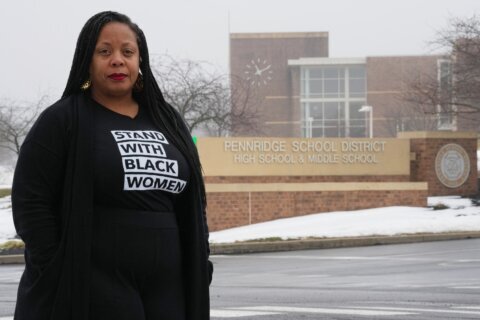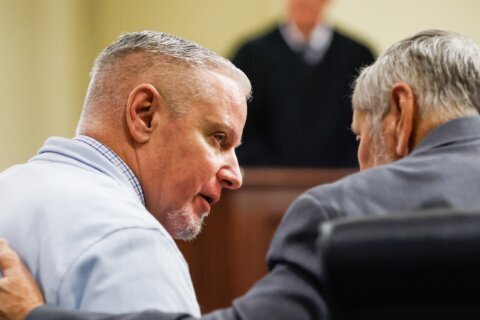George Washington University in D.C. will officially move forward with the process of arming campus police officers, the school announced Monday.
According to a university news release, GW Police Department executive supervisory officers Chief James Tate and Captain Gabe Mullinax will be armed in the coming weeks — “the first of a multi-phase implementation process.”
Rising gun violence rates nationwide and the need for campus police to respond quickly to “life-threatening emergencies” are factors driving the policy, the release said.
After the university’s Board of Trustees directed administrators to equip specially trained GWPD officers with firearms in April, school leadership started to seek community feedback on how to best implement the measure.
The news release said officials met with student groups, faculty, staff and other campus stakeholders throughout the spring semester to get community input on the matter. Over the summer, comments submitted through an online feedback portal were reviewed and used to make plan revisions.
“Some community members have voiced their concerns, and our work now is to continue to ensure our implementation is guided by community feedback,” said the university’s President Ellen M. Granberg in the release.
What’s in the plan?
The university specifies in its release that only GWPD supervisors will be armed as part of the plan, starting with Tate and Mullinax. Any additional supervisors will be armed in phases, with community feedback considered.
As part of the plan, the school also developed a new Use of Force Policy to outline situations when officers are allowed to use force, establish protocol for investigating cases in which force is used and lists unauthorized uses of force, such as chokeholds.
All armed officers will have to complete implicit bias training each semester, plus monthly de-escalation training and mental health response training three times per year. Officers must also finish their firearms qualifications three times a year — more than the District itself requires at just once annually — and virtual reality simulator training every month.
Supervisors will also have new background investigations and psychological evaluations conducted before they are armed, and any supervisors new to the school must complete a pre-arming period to ensure they are familiar with the campus and community.
Additionally, the university will form an Independent Review Committee, designed with input from the community, to help oversee GWPD and review all instances of use of force with a firearm. The committee will include faculty, staff, and student representatives.
Currently, the release said, administrators are developing a nomination and application process for establishing permanent membership on this committee. In the meantime, an interim committee will be appointed before arming begins.
Finally, the university said campus police will be more visible this semester. According to the release, they’ll participate in more student events, work with the Faculty Senate and Staff Council and collaborate with residential life, among other initiatives.
“It’s critical that we continue our ongoing engagement with our students, faculty, staff and neighbors so that we account for the varying perspectives of our diverse stakeholders moving forward,” Tate said in the release.
Where the community stands
While university officials emphasize their focus on incorporating community input as they move forward with the plan, some campus stakeholders are speaking out against the decision.
NBC Washington reported Tuesday that more than 200 of the school’s faculty members signed a letter denouncing the plan.
“Prevention of gun violence is much more than just having more armed people in an area,” Eli McCarthy, a professor of peace studies at the university who helped pen the letter, told NBC Washington.
He added that faculty were surprised by the announcement, saying it felt “abrupt.”
Letter writers cited a study published by the Journal of the American Medical Association in 2021, which found the rate of death in mass school shootings that took place between 1980 and 2019 was 2.83 times greater at schools that had armed guards.
McCarthy told NBC Washington that he also has concerns about how racial inequality will affect student safety once officers are armed.
“In the aggregate, it’s more likely that students — and particularly Black and persons of colors — are going to be harmed if we arm our officers,” McCarthy said.
However, other community members voiced support for the plan. NBC4 also spoke to student Stefan Cohn, who said that “in scenarios where bad things do happen on campus, [police] are the first people to respond.
Another student, Kevin Berman, expressed a similar sentiment: “Unfortunately, in today’s world and in a world with a Second Amendment, the police need to be armed, too.”
In Monday’s news release, Granberg said “safety is our first priority,” adding, “This is deeply personal for each of us based on our identities and experiences. “I want everyone not only to be safe but also to feel safe on our campuses.”








